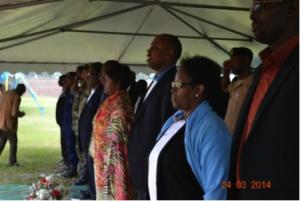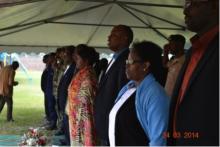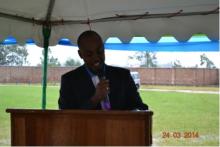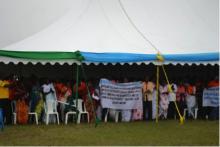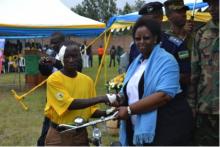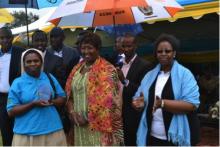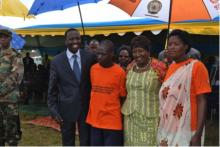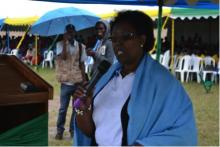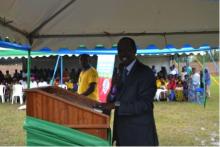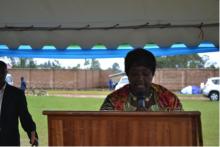Rwanda commemorates World TB Day
Monday 24th March 2014 was world TB Day. World TB Day was designed to commemorate the discovery of the TB causing bacteria, tuberculosis bacillus by Dr. Robert Koch in 1882. Currently, TB is still endemic in many nations around the world and affects 9 million people each year, and kills 1.3 million annually.
In Rwanda, 6000 cases of TB were notified in 2013, 2000 of which were in Kigali and 60% smear positive. As such, TB is still a huge public health concern in Rwanda. Therefore, every year, the ministry of health in Rwanda hosts an event to mark World TB Day. This year, the event was held in Nyanza district, in the southern province of Rwanda. The purpose of the event was to raise public awareness of TB prevention, diagnosis and treatment, and ensure that those at risk of TB have access to necessary information and facilities.
The slogan for this year’s event was : ‘Kwisuzumisha kwipimisha no kwivuza indwara y’igituntu bigere kuri buri wese (Early Detection, Diagnosis and Treatment of Tuberculosis is a right for all). The event was attended by hundreds of people including the general public, schools, community health workers, Rwanda Biomedical Centre, Ministry of Health officials and development partners such as UN Agencies and USAID. The Mayor of Nyanza District kicked off the event by welcoming participants and providing the audience with an overview of the event. This was followed by energetic Rwandan dance troupes, an entertaining and educational sketch on TB prevention by Urunana, and speeches by special guests including: Deputy Director General of Rwanda Biomedical Centre, Governor of the Southern District, ONEUN Rwanda (represented by Head of TB/Malaria program at WHO) and guest of honour, Hon. Minister of Health, Dr. Agnes Binagwaho.
The Hon. Minister highlighted Rwanda’s achievements in TB treatment, stating that Rwanda ‘is now at a 89% curative rate compared to WHO’s target of 85%’. She also emphasised that this was not the ceiling, and asserted that every TB sufferer in Rwanda should be reached and provided with necessary treatment. Additionally, WHO head of TB and Malaria, on behalf of ONE UN Rwanda, praised community health workers for their key role in preventing and treating TB. In 2013, 51.2% of TB suspects were referred by community health workers and 30% sputum smear positive were also referred by CHWs. Furthermore, 93.5% of TB patients followed by community health workers were successfully treated against TB. To celebrate this achievement, community health workers who contributed in bringing the most TB suspects and confirmed TB cases were awarded were awarded prizes by Hon. Minister (reference) .
As the event drew to a close, all leaders urged Rwandans to remember that TB is curable, and the importance of their active participation in the fight against TB by seeking early diagnosis and treatment.
_____________________________________________
01 02 03 04 05 06 07 08 09
Meeting participants including (right to left) Dr. Julie Mugabekazi (WHO), Mayor of Nyanza district and Hon.Minister Dr. Agnes Binagwaho sing the national anthem to kickstart World TB day event
Mayor of Nyanza district, Abdallah Murenzi, welcomes participants to World TB Day event in Nyanza district
Community health workers display this year’s slogan ‘Kwisuzumisha, kwipimisha no kwivuza indwara y’igituntu bigere kuri buri wese’
Dr. Julie Mugabekazi, head of Malaria/TB program at WHO Rwanda congratulates community health worker
Hon. Minister and Dr. Julie Mugabekazi (WHO) pose with sister in charge of Ruyenzi health centre, awarded for it’s achievements in the fight against TB
Governor of Southern province Alphonse Munyentwali and Hon. Minister, Dr Agnes Binagwaho celebrate the work of community health workers
Dr. Julie Mugabekazi (WHO) speaks about Rwanda’s achievements and challenges in fighting TB
Governer of southern province, Alphonse Munyentwali addresses participants
Hon. Minister Dr. Agnes Binagwaho gives closing remarks as Guest of Honor
Photo credits: Sheila Mburu/WHO



